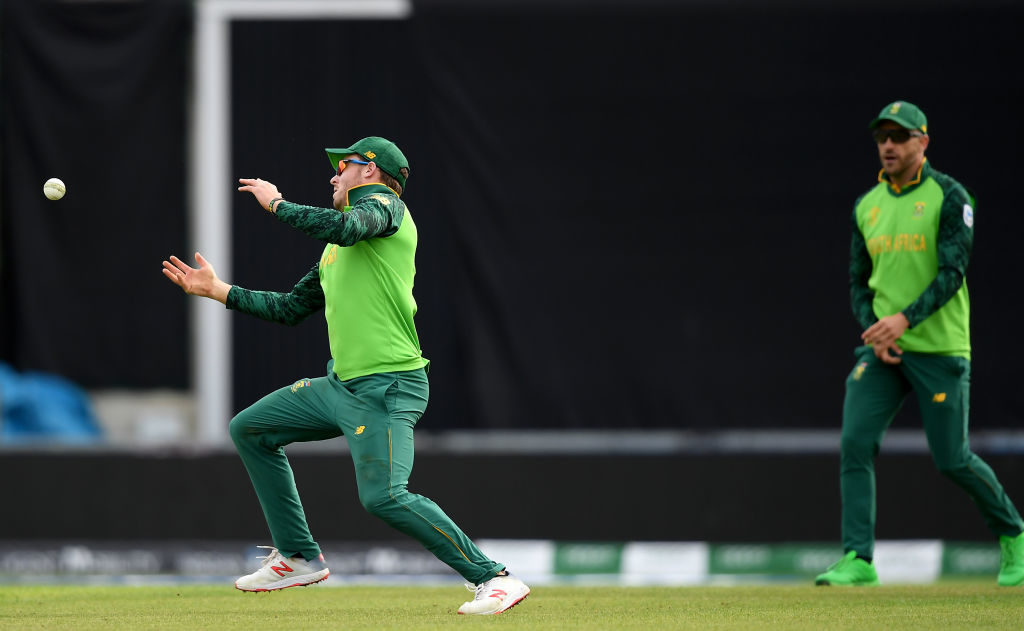Five takeaways from the Proteas’ six-wicket defeat to India at the Rose Bowl, which leaves them on the brink of elimination, writes KHALID MOHIDIN.
REPORT: Proteas’ World Cup hopes in tatters
Proteas clueless against spin bowling plan
The Proteas and their batting coach had a year to prepare and find a plan for those two India spinners who gave them nightmares on their tour to South Africa last year. Benkenstein refused to admit that his batsmen had a problem against Yuzvendra Chahal and Kuldeep Yadav, the pair who took 16 and 17 wickets respectively in their 5-1 drubbing of South Africa during that series. It seems as if the planners have learned nothing at all from their past mistakes. Chahal took 4-51 and Yadav took 1-46, as the Proteas’ senior players were bamboozled. Jasprit Bumrah added to that misery with the new ball when he removed the Proteas’ openers. Ultimately the Proteas got their batting plans wrong throughout this tournament, and Benkenstein needs to reset his strategy.
Faf is lost at the toss
Three times Faf du Plessis won the toss, and all three times he made the incorrect decision by misreading the conditions and the wicket. At the Rose Bowl, he made a terrible decision to bat first in overcast conditions, playing into the hands of India, who have lethal swing bowlers and spinners. Bumrah, especially, benefited from bowling first. The movement he generated troubled the opening pair and was the cause of their downfall. This instantly put the Proteas on the back foot. They selectors also refrained from picking Aiden Markram, who had an amazing purple patch for Hampshire at the Southampton ground leading up to the World Cup.
READ: Faf: Bowling first didn’t make sense
Batsmen must play to their strengths
Why haven’t they? Maybe it’s pressure, or maybe it’s a lack of confidence in their own abilities, or maybe the brains trust have too much power in deciding the strategy that needs to be implemented. Nonetheless, we have players who are comfortable playing an attacking game, and were then expected to suddenly change their approach in the World Cup. Quinton de Kock faced 17 balls for his 10 before he was dismissed, uncharacteristically batting at a strike rate of under 60, slow by his standards. David Miller usually takes a couple of balls to get his eye in, before letting go. He refrained from attacking the spinners and was dismissed lobbing a straight drive back to Chahal for a 40-ball 31.
Andile Phehlukwayo, Chris Morris and Kagiso Rabada showed the right attitude and were the only players to try and implement a positive brand of cricket. The rest of the batsmen need to follow their lead. The natural blend and variety in the batting lineup should allow the Proteas to deal with any situation. Amla and De Kock provide the perfect blend of calmness and aggression. Du Plessis should provide an anchor if anything goes south. Van der Dussen has shown he can adapt his game to any situation. And then you have Miller, JP Duminy and your all-rounders who play an attacking game. Sounds like the perfect recipe on paper.
Rabada peaking at the right time
The 24-year-old found dangerous pace and movement with the new ball. He seemed fired up to take the fight to India and managed to make the crucial impact that was needed from him. Unfortunately, he never got the support from his fellow bowlers. The bowlers were impressive this time out and took India to the wire. The Proteas have failed to find a balanced game with both batsmen and bowlers sharing the responsibilities.
The two most difficult games are out of the way
The Proteas should feel relief that the two toughest games are out of the way. They have played the two best teams in the World Cup early on. Despite the blip against Bangladesh, they are very capable of beating the other six teams left to play. Six wins were estimated as the benchmark to make it into the knockout stage. If that is the case, then the Proteas must win all their remaining games. Their road to the semi-final could be made easier if ‘smaller’ teams cause some upsets against the bigger sides and reduce the number of games needed to finish in the top four.
Photo: Alex Davidson/Getty Images







